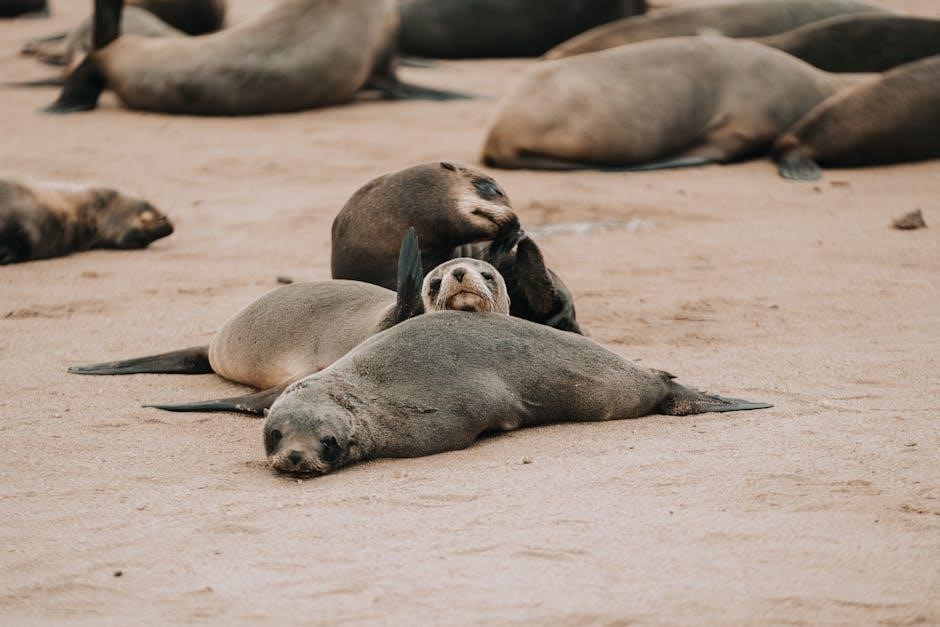The ocean is Earth’s lifeblood, covering over 70% of its surface. It regulates climate, sustains biodiversity, and supports global economies. Protecting it ensures a sustainable future.
1.1 The Importance of Ocean Studies
Ocean studies are vital for understanding the intricacies of marine ecosystems and their impact on Earth’s climate. By examining ocean health, scientists can uncover insights into biodiversity, weather patterns, and the effects of human activities. These studies also reveal how oceans regulate climate and support global food systems. Documenting ocean data in formats like PDFs ensures that research findings are preserved and accessible for future generations. This knowledge is essential for developing sustainable practices and addressing challenges like pollution and overfishing. Ocean studies also highlight the need for conservation efforts, such as protecting at least 30% of the global ocean. This research lays the foundation for effective policies and public awareness campaigns.
The Need for Ocean Conservation
Protecting the ocean is crucial for maintaining biodiversity, regulating climate, and ensuring food security. Human activities threaten marine ecosystems, making conservation essential for sustainable future.
2.1 Marine Protected Areas
Marine Protected Areas (MPAs) are essential for safeguarding ocean biodiversity and ecosystems. These designated regions restrict human activities to preserve habitats and allow marine life to thrive. MPAs play a critical role in maintaining ecological balance, supporting fisheries, and fostering climate resilience. However, only a small fraction of the ocean is currently protected, highlighting the urgent need for expansion. PDF documents are widely used to share data, research, and policies related to MPAs, ensuring that stakeholders have access to vital information. By documenting MPA successes and challenges, PDFs help advocate for stronger conservation measures and international cooperation to protect marine ecosystems effectively.
2.2 Biodiversity Hotspots
Ocean biodiversity hotspots are regions with exceptional concentrations of unique and threatened marine species. Coral reefs, deep-sea vents, and coastal ecosystems are prime examples, hosting countless endemic species. These areas are vital for maintaining ecological balance and providing essential ecosystem services. PDF documents play a crucial role in sharing research and data on these hotspots, highlighting their importance and the threats they face. Pollution, overfishing, and climate change are major concerns, necessitating urgent conservation efforts. Protecting these hotspots ensures the survival of marine life and supports global biodiversity. International cooperation and targeted conservation strategies are essential to safeguard these critical ecosystems for future generations. Biodiversity hotspots are irreplaceable natural treasures that demand immediate action and preservation.
Impact of Human Activities on the Ocean
Human activities like pollution, overfishing, and habitat destruction severely impact ocean health, threatening marine biodiversity and disrupting ecosystems. Climate change exacerbates these issues, demanding urgent conservation efforts.
3.1 Pollution and Its Effects
Pollution is a major threat to ocean health, with plastic waste, chemical runoff, and industrial discharge contaminating marine ecosystems. These pollutants harm aquatic life, disrupt food chains, and degrade habitats. Plastic debris, in particular, persists for centuries, entangling creatures and introducing toxic chemicals into the food web. Coastal areas face additional risks from agricultural fertilizers and sewage, leading to dead zones where oxygen levels drop, killing fish and other organisms. The cumulative impact of pollution not only endangers biodiversity but also affects human health through contaminated seafood and disrupted livelihoods. Addressing pollution requires global cooperation, stricter regulations, and innovative solutions to mitigate its far-reaching consequences on marine and human well-being.
3.2 Overfishing and Its Consequences
Overfishing is a critical issue threatening marine ecosystems and global food security. Excessive fishing depletes fish populations, disrupting the delicate balance of ocean food chains. This practice often damages habitats, as fishing gear harms coral reefs and seafloors. The economic impact is significant, as depleted stocks jeopardize livelihoods in fishing communities and industries. Additionally, bycatch—the catching of non-target species—further exacerbates biodiversity loss. Sustainable fishing practices, such as catch limits and marine protected areas, are essential to restore fish populations. Without urgent action, overfishing will continue to undermine ocean health, affecting both marine life and human societies dependent on seafood resources. Addressing this issue requires global cooperation and stricter enforcement of fishing regulations.
Innovative Solutions for Ocean Conservation
Innovative solutions like renewable energy and clean beach initiatives are transforming ocean conservation. These approaches reduce pollution and promote sustainability, ensuring a healthier ocean for future generations.
4.1 Renewable Energy Solutions
Renewable energy solutions are pivotal in reducing the ocean’s reliance on fossil fuels. Offshore wind farms and tidal energy harness natural currents to generate clean power. Hydrogen, produced using renewable electricity, offers a promising alternative for energy storage and maritime use. These innovations lower emissions, combating climate change and ocean acidification. By integrating renewable energy, we reduce pollution and protect marine ecosystems. Such solutions not only support sustainable energy needs but also promote a healthier ocean environment for future generations, ensuring biodiversity and ecological balance are maintained. Transitioning to renewables is a critical step in safeguarding the ocean’s vitality and fostering a sustainable future.
4.2 Clean Beach Initiatives
Clean Beach Initiatives aim to restore coastal areas by reducing pollution and preserving natural ecosystems. These projects often involve community-driven efforts to collect waste, promote recycling, and educate the public about the importance of marine conservation. For instance, the concept of using the ocean as a “big sponge” highlights the need for sustainable practices to maintain its health. Local communities play a crucial role in these initiatives, fostering a sense of responsibility toward their environment. By addressing pollution and waste management, Clean Beach Initiatives not only protect marine biodiversity but also enhance the aesthetic and economic value of coastal regions. Such efforts are essential for creating a sustainable future for both the ocean and its surrounding communities.
The Role of PDFs in Ocean Conservation
PDFs play a vital role in ocean conservation by documenting and sharing scientific data, reports, and strategies effectively. They ensure knowledge is preserved and accessible globally, aiding researchers and policymakers in making informed decisions to protect marine ecosystems and promote sustainability.
5.1 Documenting Ocean Data
Documenting ocean data in PDFs is crucial for conservation efforts. These files store detailed information on marine biodiversity, water quality, and climate impact. Researchers rely on this data to analyze trends and develop strategies. PDFs also archive historical records, ensuring long-term preservation of knowledge. By organizing data into accessible formats, scientists can easily share findings globally, fostering collaboration. This documentation supports policy-making and educational initiatives, making it a cornerstone of effective ocean management and sustainability.
5.2 Sharing Knowledge Effectively
Sharing knowledge effectively is vital for ocean conservation. PDFs play a key role in disseminating information to diverse audiences. They allow researchers to compile complex data into accessible formats, ensuring clarity and readability. By publishing findings in PDFs, scientists can reach policymakers, educators, and the public effortlessly. This format also supports multimedia integration, enhancing engagement. PDFs are ideal for creating educational materials, such as brochures or reports, that highlight marine biodiversity and conservation needs. They facilitate global collaboration by enabling easy sharing across platforms. Effective knowledge sharing through PDFs fosters awareness and drives actionable solutions, making it a powerful tool in the fight to protect our oceans.
Policy and Advocacy for Ocean Protection
Policymakers must prioritize ocean conservation through legislation. Advocacy efforts ensure sustainable practices are implemented. Voting for leaders who support marine protection is crucial for long-term ocean health.
6.1 Voting on Ocean Issues
Voting on ocean issues is a powerful tool for change. By electing officials who support marine conservation, individuals can influence policies protecting biodiversity and combating pollution. Staying informed about candidates’ stances ensures decisions align with ocean preservation goals. Advocacy extends beyond Election Day, as consistent engagement with leaders maintains pressure for sustainable practices. Grassroots movements and public awareness campaigns also play vital roles in shaping agendas. Collectively, these efforts foster a culture of accountability, ensuring oceans remain a priority. Voting is not just a right but a responsibility in safeguarding marine ecosystems for future generations.
Education and Awareness
Education and awareness are crucial for ocean conservation. Informing societies about marine ecosystems fosters stewardship and sustainable practices, ensuring a healthier planet for future generations.
7.1 The Role of Education in Conservation
Educating people about ocean conservation empowers them to make informed decisions. Schools and communities play a vital role in fostering awareness and promoting sustainable practices. By integrating ocean studies into curricula, future generations gain the knowledge and skills needed to protect marine ecosystems. Education not only raises awareness but also inspires action, encouraging individuals to participate in initiatives like clean beach programs and reducing plastic use. Furthermore, it equips students with critical thinking skills to address complex environmental challenges. Thus, education serves as a cornerstone for building a society committed to preserving the ocean’s health and biodiversity for years to come.
7.2 Integrating Ocean Studies in Curriculum
Integrating ocean studies into educational curricula is essential for fostering environmental stewardship. By incorporating marine science and conservation topics, students gain a deeper understanding of the ocean’s role in Earth’s ecosystems. Schools can adopt interdisciplinary approaches, blending biology, chemistry, and geography to explore ocean-related issues. Practical activities, such as field trips to coastal areas or virtual dives, enhance learning experiences. Curriculum integration also encourages critical thinking about human impacts on marine life and promotes empathy for conservation efforts. This educational foundation prepares future generations to address ocean challenges effectively and sustainably, ensuring they become informed advocates for marine protection and environmental health.

Economic and Social Benefits of Conservation
Ocean conservation offers significant economic and social benefits. Protecting marine ecosystems supports industries like fishing, tourism, and shipping, creating jobs and boosting local economies. Coastal communities rely on healthy oceans for food security and cultural practices. Conservation efforts also enhance biodiversity, ensuring long-term sustainability of marine resources. Additionally, sustainable practices reduce pollution, improving public health and quality of life. Investments in ocean conservation can foster innovation, driving economic growth through eco-tourism and renewable energy. By prioritizing conservation, societies can balance economic development with environmental stewardship, ensuring a prosperous future for generations to come. These benefits underscore the importance of preserving the ocean’s health for both economic stability and social well-being.
Cultural Significance of the Ocean
The ocean holds profound cultural significance across the globe. It has inspired art, literature, and spirituality for centuries, serving as a symbol of life, mystery, and interconnectedness. Many cultures revere the ocean as a sacred entity, embedding its imagery in myths, rituals, and traditions. Coastal communities often celebrate the ocean through festivals and storytelling, reflecting its role in their identity and heritage. Additionally, the ocean has historically connected civilizations through trade and migration, shaping diverse cultures. Its beauty and power continue to inspire creativity and wonder, making it a cornerstone of human cultural expression and shared heritage.

Challenges in Ocean Conservation
Ocean conservation faces numerous challenges, including funding shortages, inadequate enforcement of regulations, and limited public awareness. Protecting marine ecosystems requires global cooperation, yet political and economic conflicts often hinder progress. Coastal development and industrial activities further exacerbate threats to marine life. Additionally, climate change complicates conservation efforts by altering ocean chemistry and temperatures. Public engagement is critical but often lacking, as many remain disconnected from marine issues. Addressing these challenges demands innovative solutions, stronger international agreements, and sustained commitment from governments, organizations, and individuals. Without urgent action, the ocean’s health and its ability to sustain life will continue to deteriorate, threatening global well-being and future generations.

Global Cooperation and Agreements
Global cooperation is essential for effective ocean conservation, as marine ecosystems transcend national boundaries. International agreements, such as the United Nations Convention on the Law of the Sea (UNCLOS), provide frameworks for managing ocean resources sustainably. Initiatives like the 30×30 target aim to protect 30% of the world’s oceans by 2030, requiring collaboration among nations; Organizations like the International Maritime Organization (IMO) regulate shipping and pollution, while regional fisheries bodies ensure sustainable practices. Sharing knowledge through platforms like PDFs enables countries to align strategies and monitor progress. Without global unity, efforts to conserve the ocean will remain fragmented and ineffective, underscoring the need for continued international dialogue and commitment to shared goals.
Future Outlook and Sustainability
The future of the ocean hinges on sustainable practices and global cooperation. By prioritizing renewable energy and reducing pollution, we can mitigate climate impacts. PDFs play a crucial role in documenting and sharing sustainable strategies, enabling widespread adoption. Education and awareness campaigns, supported by accessible PDF resources, empower communities to take action. The integration of ocean studies into curricula ensures future generations understand the importance of conservation. Innovative solutions, such as marine protected areas and clean energy initiatives, must be widely implemented. The ocean’s health is intertwined with humanity’s future, making sustainability efforts imperative for all. Collective action and knowledge sharing through platforms like PDFs will pave the way for a resilient and thriving ocean ecosystem.

Sustaining Marine Biodiversity
Sustaining marine biodiversity is crucial for maintaining healthy ecosystems. Protecting habitats like coral reefs and mangroves ensures species survival. Reducing pollution and overfishing preserves biodiversity. PDFs document these efforts, aiding conservation by sharing knowledge widely. Educating communities about biodiversity’s importance fosters stewardship. Sustainable fishing practices prevent depletion, ensuring fish populations thrive. Marine protected areas safeguard vulnerable species, promoting ecological balance. Addressing climate change mitigates ocean acidification and temperature rises, which threaten biodiversity. Collaborative efforts between scientists, policymakers, and the public are essential. By prioritizing biodiversity, we ensure the ocean remains a vibrant, life-supporting system for future generations. Conservation strategies must be adaptive, addressing new challenges while building resilience. The ocean’s biodiversity is a shared heritage, requiring global commitment to preserve its richness and complexity.
Addressing Climate Change
Climate change poses significant threats to ocean health, including acidification, rising temperatures, and sea-level rise. These changes disrupt marine ecosystems, causing coral bleaching and fish migration. PDFs play a role in documenting climate impacts and sharing solutions. Reducing greenhouse gas emissions is critical to mitigating these effects. Protecting coastal ecosystems like mangroves and wetlands helps sequester carbon. Renewable energy solutions, such as offshore wind farms, reduce reliance on fossil fuels. International cooperation is essential to address global challenges. Public awareness campaigns, enabled by PDF resources, educate communities about climate risks. Policy advocacy ensures governments prioritize ocean protection. Combating climate change requires a holistic approach to safeguard marine biodiversity and coastal communities for future generations.

Promoting Public Awareness
Promoting public awareness about ocean conservation is vital for inspiring action. Educational campaigns highlight the importance of marine ecosystems and the threats they face. PDF resources, such as guides and reports, provide accessible information on ocean health. Sharing knowledge through social media and community events engages diverse audiences. Clean beach initiatives and citizen science projects encourage direct participation. Public awareness fosters a sense of responsibility, driving individuals to adopt sustainable practices. By educating people about the interconnectedness of ocean and human health, we can build a global movement for conservation. Awareness campaigns also emphasize the role of renewable energy and ethical policies in protecting marine biodiversity for future generations.

Scientific Research and Development
Scientific research and development play a crucial role in advancing ocean conservation. Innovations like renewable energy technologies, such as hydrogen production, offer sustainable solutions for reducing ocean pollution. Marine conservation efforts benefit from cutting-edge tools like underwater sensors and AI-driven monitoring systems. These technologies help track biodiversity, detect pollution, and study climate impacts. Research initiatives also focus on developing eco-friendly materials to replace harmful plastics. Collaborative efforts between scientists, engineers, and policymakers ensure that findings are translated into actionable strategies. By investing in R&D, we can address complex challenges and devise effective solutions for preserving marine ecosystems. Science-driven approaches are essential for achieving long-term ocean sustainability and combating global environmental threats. Continuous innovation will pave the way for a healthier, more resilient ocean.

Ethical Considerations
Ethical considerations are vital in ocean conservation, emphasizing the need to balance human activities with environmental protection. Transforming the ocean into a “swimming pool” raises ethical concerns, as it disregards natural ecosystems. Ethical solutions prioritize sustainability, ensuring that human interventions, like clean beach initiatives, respect marine life. The ethical management of renewable energy projects, such as hydrogen production, is crucial to avoid harming biodiversity. Ethical frameworks guide decision-making, ensuring fairness in resource distribution and minimizing harm to vulnerable species. By adhering to ethical principles, we can promote a harmonious relationship between human needs and ocean health, fostering long-term sustainability and environmental justice.
